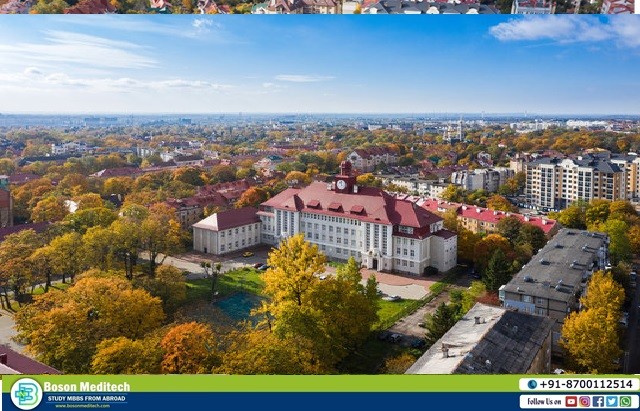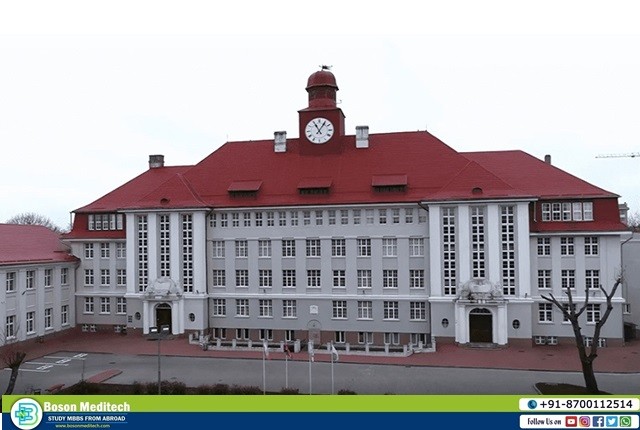
Immanuel Kant Baltic Federal University (IKBFU) was founded in 1967, building upon the Kaliningrad State Pedagogical University established in 1947. It originated from the State Pedagogical Institute in Kaliningrad. IKBFU, located in the heart of Europe, is one of Russia’s ten federal universities. The university attracts students and researchers from 50 countries, serving as a scientific and educational bridge between Europe and Russia. IKBFU upholds the academic traditions of its predecessor, the ‘Albertina’ University of Königsberg, while integrating the latest technologies of Russian classical education. The university embodies the spirit of ‘Albertina,’ where influential figures like Immanuel Kant, Bessel, Jacobi, and Schiller were associated. The degree is valid world wide and is also listed in the World Directory of Medical School.
Studying MBBS at Immanuel Kant Baltic Federal University combines affordability, convenience, language flexibility, modern infrastructure, and practical exposure, making it an attractive option for aspiring medical professionals. The globally recognized MBBS degree and access to quality clinical training further enhance the educational experience for students.
Immanuel Kant Baltic Federal University, Russia Highlights 2025
| Immanuel Kant Baltic Federal University, Russia | |
| Address | Ulitsa Aleksandra Nevskogo, 14, Kaliningrad, Kaliningrad Oblast, Russia, 236041 |
| World Ranking | 2604 |
| Country Ranking | 66 |
| Established | 1967 |
| Recognition | WHO, ECFMG, UNESCO and Ministry of Russia |
| Official Website | https://kantiana.ru/en/ |
| Eligibility | 50 % in Physics, Chemistry and Biology |
| NEET | NEET Qualification is mandatory |
| Tuition Fees | 3,15, 525 Rubles |
| Hostel Charges | 20,000 Rubles |
| Cost of Living | 180$-250$ |
| Course Duration | 5+1 (MBBS + Internship) |
| Medium of MBBS Course | English and Russian |
| Degree Provided | MD Physician |
| University Type | Government |
Immanuel Kant Baltic Federal University – MBBS Fee Structure 2025
The fee structure for Immanuel Kant Baltic Federal University for MBBS program is given in the table below:
| 1st Year | 2nd Year | 3rd Year | 4th Year | 5th Year | 6th Year | |
| Tuition Fee | 3,15,525 Rubles | 3,15,525 Rubles | 3,15,525 Rubles | 3,15,525 Rubles | 3,15,525 Rubles | 3,15,525 Rubles |
| Hostel | 20,000 Rubles | 20,000 Rubles | 20,000 Rubles | 20,000 Rubles | 20,000 Rubles | 20,000 Rubles |
| Medical Insurance, Check up, Visa Ext, Dactyloscopy, Notarization, Biometric, Translation etc | 30,000 Rubles | 20,000 Rubles | 20,000 Rubles | 20,000 Rubles | 20,000 Rubles | 20,000 Rubles |
Food and other expenses like one time charges are separate. Kindly Use Dollar to INR Current Exchange rate and Call Boson Meditech For Admissions and Queries at +91-8700112514
Total Cost and Budget of Studying MBBS at Immanuel Kant Baltic Federal University 2025
The total budget of MBBS at Immanuel Kant Baltic Federal University, Russia including the 6 years’ tuition fees, hostel charges, food charges, and average cost of living and expenses of the student would be 29 Lakhs to 32 Lakhs in Indian Rupees.
Immanuel Kant Baltic Federal University Address:
Ulitsa Aleksandra Nevskogo, 14, Kaliningrad, Kaliningrad Oblast, Russia, 236041
Immanuel Kant Baltic Federal University Website:
Official website of Immanuel Kant Baltic Federal University is https://kantiana.ru/en/
Immanuel Kant Baltic Federal University Ranking
| Immanuel Kant Baltic Federal University Country ranking | 66 |
| Immanuel Kant Baltic Federal University world ranking | 2604 |
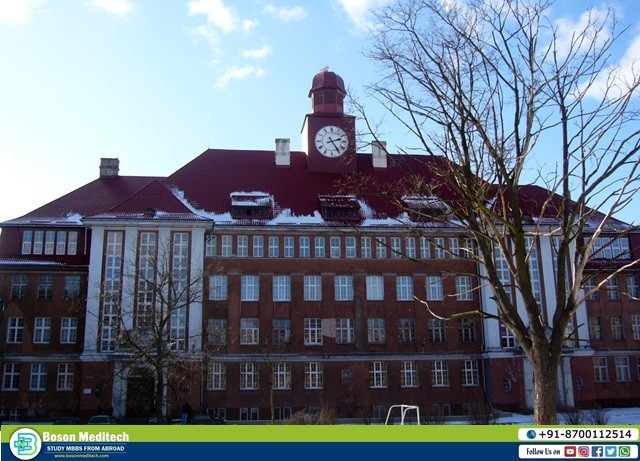
Recognitions of Immanuel Kant Baltic Federal University
Immanuel Kant Baltic Federal University is recognized by the follwing recognizing and accreditation agencies:
- National Medical Commission (erstwhile Medical Council of India);
- Ministry of Science and Higher Education, Russia (MSHE);
- World Directory of Medical Schools (WDOMS);
- Education Commission for Foreign Medical Graduates (ECFMG);
- Foundation for Advancement of International Medical Education and Research (FAIMER).
Faculties of Immanuel Kant Baltic Federal University
There are 4 faculties in Immanuel Kant Baltic Federal University:
- Faculty of Medicine
- Faculty of Surgical Disciplines
- Faculty of Obstetrics & Gynecology
- Faculty of Therapy
Advantages of Studying MBBS at Immanuel Kant Baltic Federal University:
Affordable Fee Structure: The university offers an affordable fee structure for MBBS in Russia, making medical education accessible at low cost to a diverse range of students.
Hassle-Free Admission Procedure: The admission process is streamlined, providing international students with a hassle-free experience when applying for MBBS programs.
Hostel Facilities for International Students: The university provides hostel facilities for international students, ensuring a supportive and comfortable living environment during their academic journey.
Bilingual Instruction: Lessons are taught in both English and Russian, catering to the diverse linguistic backgrounds of international students.
Well-Structured and Advanced Infrastructure: The university boasts a well-structured and advanced infrastructure, fostering a conducive learning environment for medical students.
Globally Accepted Medical Degree: Graduates receive a globally accepted medical degree, enabling them to practice medicine anywhere in the world after successful completion of their studies.
Advanced Laboratories and Classrooms: State-of-the-art laboratories and classrooms provide students with both theoretical knowledge and practical exposure, ensuring a comprehensive medical education.
Clinical Training at Top Hospitals and Clinics: The university offers clinical training opportunities at top hospitals and clinics, allowing students to gain real-world experience and practical skills in a clinical setting.
Features of Immanuel Kant Baltic Federal University (IKBFU):
Diverse Student Body: Students from 40 countries and 85 Russian regions contribute to the international and regional diversity of the university.
Enrollment Statistics: IKBFU has a total enrollment of 10,229 students across vocational and higher education programs.
Gender Diversity: A significant proportion of students, 64%, are female, indicating a balanced gender representation.
Educational Programs: The university offers a comprehensive range of 166 education programs, catering to diverse academic interests.
Residential Facilities: Approximately 20% of students live in dormitories, fostering a sense of community and providing convenient accommodation options.
Modern Dormitories: The university has a total of 7 dormitories, with an additional 5 new dormitories to accommodate students.
Student Organizations: There are 11 student organizations, promoting extracurricular involvement and leadership among students.
Campus Facilities: IKBFU boasts 671 facilities, including classrooms, laboratories, and recreational spaces.
Research Laboratories: The university is equipped with 27 research laboratories, fostering a research-intensive environment.
International Collaborations: IKBFU has established 100 research collaborations with international partners, contributing to global knowledge exchange.
Educational Institutions: The university encompasses 10 educational institutions, providing a diverse array of academic disciplines.
Campus Architecture: The campus is distributed across 54 buildings, creating a well-structured and expansive learning environment.
International Student Percentage: The university has a 9.6% international student population, reflecting its global appeal.
Budget Growth: In 2017, the university experienced a noteworthy budget growth of 23%, indicating financial stability and development.
Sports Facilities: IKBFU offers 18 sports facilities, including swimming pools, football pitches, and track and field facilities, promoting physical fitness among students.
International Accreditation: 30% of degree programs at the university are internationally accredited, ensuring high academic standards.
Regional Workforce Contribution: The university plays a vital role in meeting regional needs, with 100% satisfaction for medical, social, and mathematician staff requirements in the region.
Immanuel Kant Baltic Federal University showcases a commitment to diversity, academic excellence, research, and international collaboration. The extensive facilities, vibrant campus life, and contributions to regional workforce needs contribute to the university’s reputation and impact.
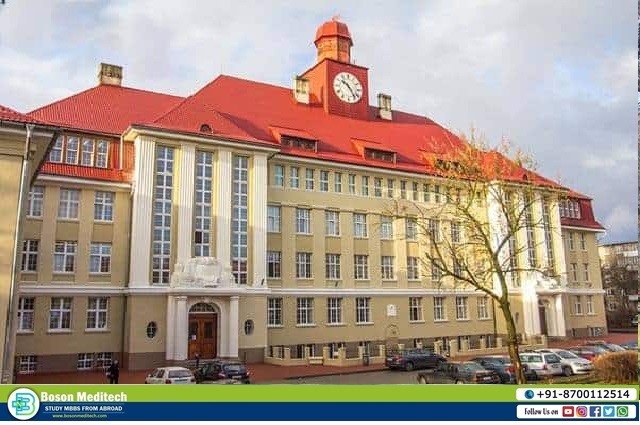
Advantages of Studying MBBS at Immanuel Kant Baltic Federal University:
Vocational Training Programs:
The university offers vocational training programs designed for international students, enhancing their practical skills and preparing them for real-world medical practice.
Global Collaborations:
Immanuel Kant Baltic Federal University has established partnerships with more than 150 international universities, providing students with opportunities for global exposure and collaborative learning.
Diverse Educational Programs:
With over 300 educational programs, students at the university have a wide range of choices to tailor their academic paths according to their interests and career goals.
Experienced Teaching Staff:
A team of 900 teaching staff members ensures the delivery of high-quality medical education, combining expertise and dedication to student learning.
Large Student Community:
With 14,000 students currently enrolled, the university provides a dynamic and diverse learning environment.
Affordable MBBS Program:
Immanuel Kant Baltic Federal University offers a cost-effective MBBS program, making medical education accessible to students from around the world.
Bilingual Instruction:
The MBBS course is taught in both English and Russian, accommodating the language preferences of international students.
Stress-Free Admissions Process:
The university ensures a stress-free admissions process, facilitating a smooth transition for students entering the medical program.
Excellent Campus Infrastructure:
The Russian universities’ campus infrastructure is excellent, providing students with state-of-the-art facilities for both academic and extracurricular activities.
Safe Environment for Female Students:
Immanuel Kant Baltic Federal University offers a safe and secure environment for female MBBS students pursuing their education.
Global Recognition:
Graduates receive a globally recognized medical degree upon completing their studies at the university, opening doors to international medical practice.
International Exchange Opportunities:
Foreign students can study for one or two semesters at partner universities without paying tuition fees, promoting cultural exchange and academic collaboration.
Immanuel Kant Baltic Federal University provides a comprehensive and globally oriented medical education, combining academic excellence with practical training and a supportive campus environment.
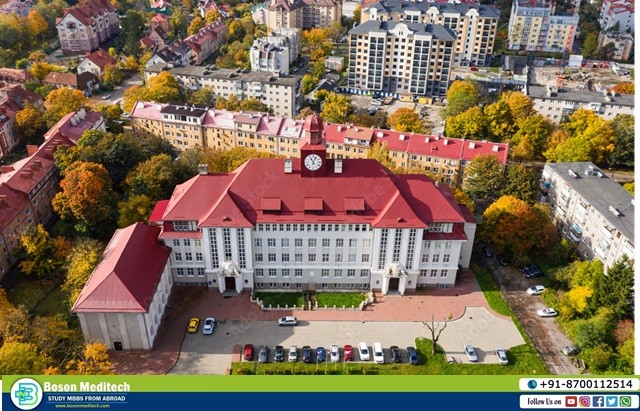
Eligibility Criteria: Immanuel Kant Baltic Federal University
To be eligible for the MBBS course at Yaroslavl State Medical University, students must meet the following criteria:
Age: Applicants must be between 17 to 25 years of age on or before December 31 of the year of admission.
Educational Qualifications:
General Category: Minimum of 50% marks in 12th standard with Physics, Chemistry, and Biology.
Reserved Category: Minimum of 45% marks in 12th standard with Physics, Chemistry, and Biology.
NEET Qualification: NEET qualification is mandatory for securing admission in the MBBS program at Yaroslavl State Medical University.
Admission Procedure:
The admission process at Yaroslavl State Medical University involves the following steps:
Step 1: Application and Confirmation Letter
Apply for the confirmation letter by submitting scanned copies of 10th and 12th-grade mark sheets, along with the birth certificate.
The university reviews the documents, and upon approval, a confirmation letter is issued within 3 to 5 working days.
Step 2: Eligibility Criteria
Ensure that the eligibility criteria set by Yaroslavl State Medical University are met to proceed with the admission process.
Step 3: Invitation Letter Application
Upon receiving the admission or confirmation letter, an educational consultant applies for an invitation letter on behalf of the student.
The processing time for the invitation letter is typically 10 to 14 days.
Step 4: Visa Application
With the invitation letter, the student can apply for a visa. Educational consultants may assist in handling the visa application process.
Step 5: Travel Arrangements
After obtaining the visa, the student can make travel arrangements. Consultants may assist in booking flight tickets.
The student is provided with hostel accommodations upon reaching the university. Consultants may aid in completing necessary documentation and other formalities. Choose Boson Meditech Educational Consultants to get direct admissions in this medical college in Russia at LOW processing Fees.
Immanuel Kant Baltic Federal University: Documents Required
- 10th and 12th-grade mark sheets (scanned copies)
- Birth certificate
- NEET Score Card
- Original Passport
- 12 Passport Size Photos (on white background)
- Medical Fitness Certificate
Course Duration:
The MBBS course duration at Yaroslavl State Medical University is 6 years, including 5 years of MBBS curriculum and 1 year of internship. The degree awarded is MD Physician.
Medium of Teaching:
The medium of teaching at Yaroslavl State Medical University is English, making it accessible to students from around the world.
In summary, the admission process at Yaroslavl State Medical University involves meeting eligibility criteria, obtaining confirmation and invitation letters, applying for a visa, making travel arrangements, and completing necessary formalities upon arrival. The assistance of educational consultants can simplify and expedite these steps for prospective students.
Student Life at Immanuel Kant Baltic Federal University:
Holistic Development:
The university actively organizes extracurricular activities for students, fostering their holistic development beyond academics.
Celebrations, Festivals, and Excursions:
Students take the lead in organizing various celebrations, festivals, excursions, and art competitions throughout the academic year, creating a vibrant and culturally rich campus atmosphere.
Sports Facilities:
The university provides top-notch sports facilities for both workouts and competitions, including basketball, volleyball, badminton, table tennis, football, futsal, rugby, swimming, track and field athletics, yoga, aerobics, hand-to-hand combat, self-defense, rowing, Zumba, and cheerleading.
Diverse Sports Activities:
A wide range of sports activities are available to students, promoting physical fitness and well-being.
Excellent Sports Infrastructure:
The university’s sports infrastructure includes a swimming pool, a stadium with running tracks and an artificial football pitch, an obstacle course, a fitness suite, an aerobics studio, as well as multiple sports halls and gyms.
Art Center:
Immanuel Kant Baltic Federal University’s Art Center provides students with a platform for freedom of expression and opportunities for creativity.
24×7 WiFi Connectivity:
The campus area is equipped with 24×7 WiFi connectivity, ensuring that students have access to online resources and communication.
Dormitory Accommodation:
Seven dormitories within walking distance from the university campus provide convenient accommodation options for students.
Research Laboratories:
The university boasts 27 research laboratories, contributing to the development of practical skills among students.
Access to E-Databases:
Students enjoy free access to various e-databases, including Cambridge Journals Digital Archive Complete Collection, IOP Historic Archive, Oxford Online Reference, and more, enhancing their research capabilities.
Immanuel Kant Baltic Federal University provides a dynamic and enriching environment for students, offering a balance between academics, extracurricular activities, sports, arts, and research. The focus on holistic development and the availability of modern facilities contribute to a well-rounded student life experience.
Hostel and Accommodation at Immanuel Kant Baltic Federal University:
Immanuel Kant Baltic Federal University prioritizes the comfort and well-being of its students by providing well-equipped and reasonably priced hostel facilities. Here are some features of the accommodation:
Comfortable Rooms:
The hostel offers students comfortable and fully furnished rooms, ensuring a conducive living environment.
Room Sharing:
Students typically share rooms, fostering a sense of community and camaraderie among residents.
Separate Accommodation for Boys and Girls:
Boys and girls have separate rooms, ensuring privacy and accommodation tailored to individual needs.
Sanitary Mess for Fresh and Healthy Cuisine:
The hostel includes a sanitary mess, providing students with fresh and healthful meals during their medical school journey.
Common Kitchen Access:
Students have access to a common kitchen where they can prepare their own food, offering flexibility in dining choices.
Full Range of Amenities:
The hostel provides all necessary amenities to meet the daily needs and comfort of students.
Internet Access: Internet access is available, allowing students to stay connected and access online resources.
Air-Conditioned Rooms: All rooms in the hostel are air-conditioned, ensuring a comfortable living environment.
Central Heating: Central heating is available to provide warmth, especially during colder seasons.
On-Site Laundry and Refrigerators: On-site laundry facilities and refrigerators are provided for the convenience of students.
Common TV Room: A common TV room is available for recreational purposes, providing a space for students to unwind.
CCTV Cameras for Safety: The hostels are equipped with CCTV cameras to enhance security and ensure the safety of residents.
Gym Facilities: Gym facilities are available, promoting physical fitness and well-being among students.
Modern Conveniences: The hostel is equipped with modern conveniences to meet the diverse needs and preferences of students.
Immanuel Kant Baltic Federal University’s hostel facilities aim to create a supportive and comfortable living environment for students pursuing their education, encompassing both essential amenities and recreational spaces.

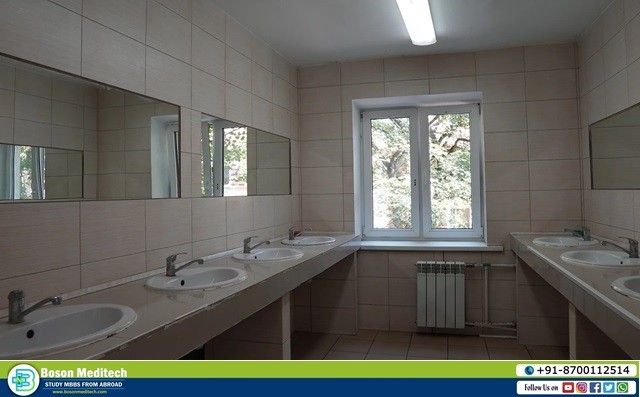
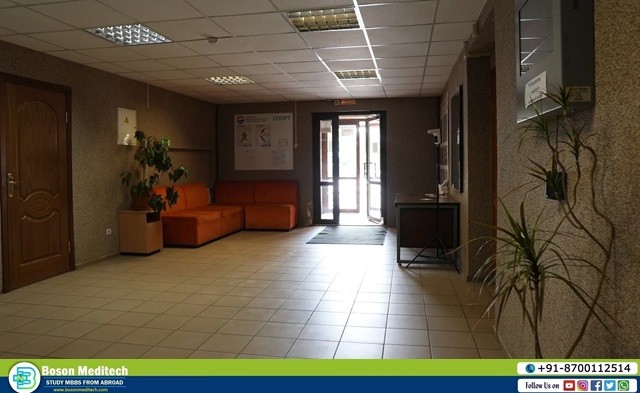
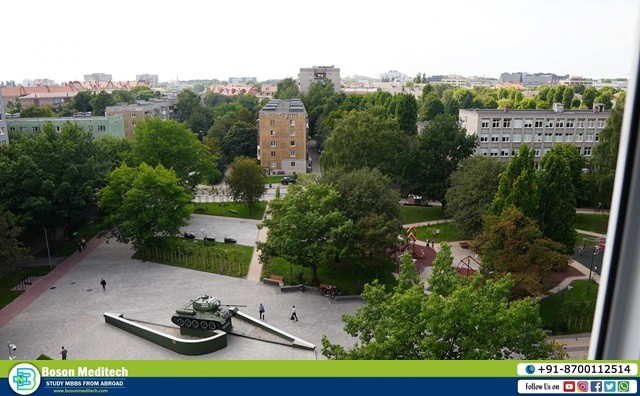
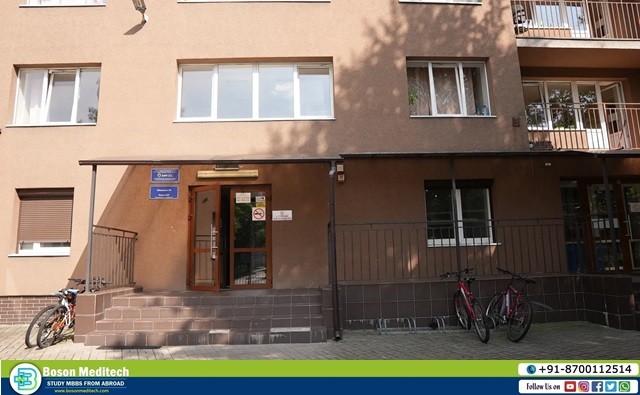


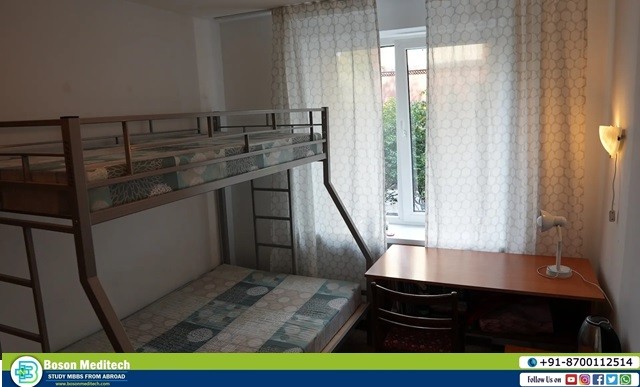
Immanuel Kant Baltic Federal University MBBS Course Syllabus
Let’s take a look at the syllabus or the curriculum of 6 years MBBS course at Immanuel Kant Baltic Federal University:
| 1st Year | |
| 1st Semester | 2nd Semester |
| Anatomy | Anatomy & Histology |
| 2nd Year | |
| 3rd Semester | 4th Semester |
| Histology | Biochemistry |
| Biochemistry | Micro-Biology |
| Psychology & Pedagogy | Physiology |
| Cell Biology | – |
| Microbiology | – |
| General Pathology | – |
| 3rd Year | |
| 5th Semester | 6th Semester |
| Pathology | Pathology |
| Pharmacology | Path Physiology |
| Micro-Biology And Path Physiology | Genetics And Principles Of Clinical Medicine |
| 4th To 6th Year | |
| 7th Semester To | 12th Semester |
| Oncology | Internal Medicine |
| Pediatrics | General Surgery |
| Neurology | Primary Care Medicine |
| Obstetrics And Gynecology | Internal Medicine |
| Neurology And Psychiatry | Psychology |
| Ent | Emergency Medicine |
| Cardiology | – |
Why Study MBBS in Russia?
Indian students choose to study MBBS in Russia for several reasons, and the decision is influenced by a combination of academic, financial, and cultural factors. Here are some of the common reasons:
Cost-Effective Education:
Tuition fees and living expenses in Russia are often lower compared to those in many Western countries. This makes it an affordable option for Indian students seeking quality education in medicine.
No Entrance Exams:
Many Russian medical universities do not require Indian students to undergo entrance exams like NEET (National Eligibility cum Entrance Test) for admission. This can simplify the application process.
English-Medium Programs:
Several Russian medical universities offer MBBS programs in English, making it accessible for international students, including Indians who may not be fluent in Russian.
World-Class Education:
Russian medical universities are recognized globally, and many of them are listed in international rankings. They often have well-qualified faculty and modern facilities for medical education.
Cultural Diversity:
Russia provides a culturally rich environment, and students have the opportunity to interact with peers from various countries. This exposure enhances cultural understanding and global perspectives.
No Donation System:
Unlike some private medical colleges in India, Russian universities typically do not have a donation system. This can be attractive for Indian students and their families seeking transparent and merit-based admission processes.
Global Recognition of Degrees:
Medical degrees obtained from recognized Russian universities are accepted worldwide, including by medical councils in India. This allows students to return to India and practice after meeting certain regulatory requirements.
Well-Established Medical Infrastructure:
Russia has a well-established medical infrastructure with advanced hospitals and research facilities. This provides students with opportunities for practical exposure and experience.
Student Support Services:
Many universities in Russia offer support services for international students, including assistance with accommodation, language support, and cultural integration programs.
Global Networking Opportunities:
Studying in Russia allows Indian students to build a global network, connecting with students and professionals from different parts of the world. This can be beneficial for future career opportunities.
Quality of Life:
Russia offers a unique cultural experience and a good quality of life. Students get the chance to explore a new country and its rich history.
It’s important for Indian students considering MBBS in Russia to research and choose universities that are recognized and accredited, ensuring that the degree they earn will be valid and accepted in their home country and beyond. Additionally, understanding the cultural and lifestyle differences can contribute to a positive and enriching educational experience.
About the City Kaliningrad
Kaliningrad is a city and an exclave of Russia located on the Baltic Sea. Here are some key points about Kaliningrad:
Geography:
Kaliningrad is situated between Poland to the south and Lithuania to the north and east. It is the westernmost part of Russia. Kaliningrad is separated from the rest of Russia, as it is not connected by land. It is an exclave, surrounded by European Union (EU) countries.
History:
Formerly Königsberg: The city was originally named Königsberg and was part of East Prussia. It was founded by the Teutonic Knights in the 13th century.
World War II: Königsberg was heavily damaged during World War II, and after the war, it became part of the Soviet Union.
Post-WWII Changes:
Renamed Kaliningrad: After the war, the city was annexed by the Soviet Union, and the name was changed to Kaliningrad in 1946.
Shift in Population: The population of the city changed significantly after World War II, with many Germans expelled and Russians moving in.
Economy:
Kaliningrad is a significant economic and cultural center in the region. The city has a special economic zone status, which has attracted foreign investment.
Politics and Administration:
Kaliningrad is currently an administrative region of Russia, having the status of a federal subject. The region has strategic importance for Russia, and there is a significant military presence.
Culture and Tourism:
Despite the destruction during World War II, Kaliningrad retains some historical landmarks, including the Königsberg Cathedral and the Brandenburg Gate. The city attracts tourists with its unique blend of Russian and European influences.
Transportation:
Transport Hubs: Kaliningrad has several transportation connections, including an international airport, a seaport, and road and rail links.
Kaliningrad Oblast:
The city is the administrative center of Kaliningrad Oblast, the Russian federal subject that encompasses the entire exclave.
Kaliningrad’s geopolitical situation as an exclave has made it a unique and sometimes sensitive area in international relations, given its proximity to European Union countries. The city continues to play a strategic role in the Baltic region.
Historical Background:
Kaliningrad city, situated on the Baltic Sea coast, has a rich history that dates back seven centuries when it belonged to Germany.
Language and Cultural Identity:
Despite its historical ties to Germany, 95% of the current population in Kaliningrad speaks Russian, and there is an understanding of the English language.
Amber Production:
Kaliningrad is renowned for its amber production. Amber, a fossilized resin, is often used in jewelry and has economic significance for the region.
Naval Presence:
The city is home to the headquarters of the Baltic Fleet of the Russian Navy, highlighting its strategic importance in naval operations.
Philosophical Heritage:
Königsberg, now known as Kaliningrad, was the birthplace and home of Immanuel Kant, one of the world’s greatest philosophers. This adds a cultural and intellectual dimension to the city’s historical significance.
FAQs about Immanuel Kant Baltic Federal University:
What is Immanuel Kant Baltic Federal University ranked?
Immanuel Kant Baltic Federal University is ranked 66 in the QS World University Rankings.
How can I get a student ID at Immanuel Kant Baltic Federal University?
After admission, students should visit the IT office (room 121 in building No. 2) with a valid passport and an ID card to obtain a student ID. This ID is required for building access and library services.
Is Immanuel Kant Baltic Federal University a good place to pursue MBBS?
Yes, Immanuel Kant Baltic Federal University is considered a top institute for medical education, offering a low fee structure, modern equipment, a healthy environment, and experienced faculty members.
Can I work during MBBS education at Immanuel Kant Baltic Federal University?
Yes, students are allowed to work part-time during their free time, but official permission is required.
Which Russian state university is named after Immanuel Kant?
Immanuel Kant Baltic Federal University is named after Immanuel Kant. It is an innovative university in the Russian Federation, aiming to maintain and develop the academic traditions of its predecessor, Albertina Koenigsberg University.
In which city is Immanuel Kant Baltic Federal University located?
Immanuel Kant Baltic Federal University is located in Kaliningrad, Russia.

